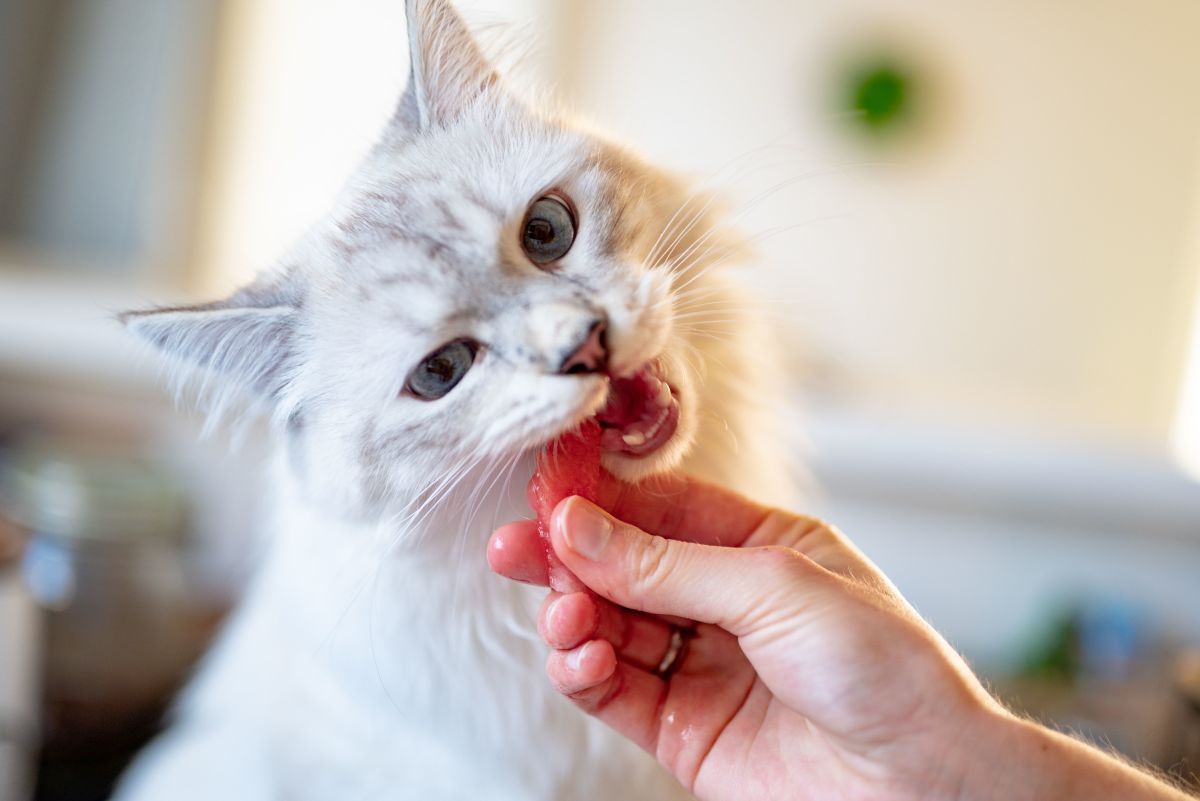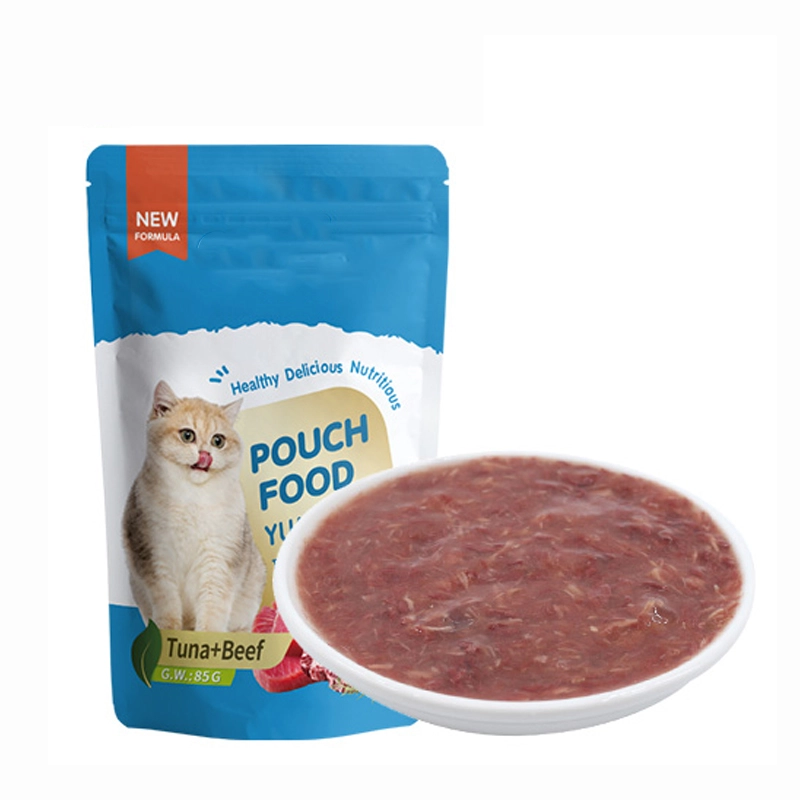30+ Human Foods That Cats Can Eat cat treats

What Human Foods Can Cats Eat?
Cats can actually eat a variety of human foods, including fruits and vegetables—and while they're known for being picky eaters, offering a variety of healthy treats can expand your pet's palette and nutrition.
OEM ODM Wholesale Wet Cat Food Pet treats Customized cat treats
Cats are categorized as obligate carnivores, meaning they need a high quantity of meat and protein in their diet in order to be healthy. They should not be on vegetarian or vegan diets; these diets lack taurine, which can only be found in animal protein and is essential for keeping your cat healthy.
Although your cat must consume a carnivorous diet, you can still introduce many colorful foods into their daily regimen; just remember to always do so in moderation. It's important, however, to always check with your veterinarian first—especially if your cat has any known health conditions; dense, nutritional foods can compromise organs and the body in pets with preexisting conditions.

What Vegetables Can Cats Eat?
The following vegetables are safe to offer your cat on occasion and in small quantities.
Asparagus
Your cat might enjoy a small serving of steamed, chopped asparagus once in a while. Make sure it is cooked and cooled. Do note, however, that because asparagus has a high alkaline profile, it might be best to skip it—especially if your cat has urinary issues. In addition, asparagus is rich in potassium and can lead to crystal formation and urinary tract blockages in cats with a history of such problems (this is especially true of neutered male cats).
Broccoli
Broccoli is considered non-toxic (it is not listed by the American Society for the Prevention of Cruelty to Animals) and can be served steamed and cooled to cats. Broccoli is rich in healthy antioxidants. Remember to only feed this as a rare treat and in small quantities. Adding anything to your cat's diet, even a small treat, can cause tummy upset if not done carefully.
Carrots
Cats can definitely eat steamed carrots. They are high in fiber and packed with a bunch of yummy nutrition. Again, as with all other vegetables, cats should be fed carrots minimally and in rare intervals. It is important to avoid raw carrots; make sure to cut the carrots up into smaller pieces so that your cat does not choke.
Green Beans
Green beans are considered safe for cats, and they are a good source of fiber, protein, and healthy vitamins. Carrots are a good snack option for cats that suffer from obesity. Foods that are rich in fiber can sometimes cause gas and GI upset, however, so make sure you introduce this treat slowly and offer it in rare intervals. Do not feed your cat canned, salted green beans—go for fresh and organic.
Peas
Cats can definitely eat peas, and a lot of commercial cat foods contain pea protein as a substitution for other proteins for cats that tend to have food protein allergies. Peas offer both carbohydrates and protein and can be a fun treat for your kitty. Always feed peas in moderation.
Pumpkin
Pumpkin is a great source of fiber and vitamins for your cat. Pumpkin can also help with issues around constipation or even complications surrounding impactions due to hairballs. Be sure to only offer your cat pure pumpkin; it should not contain spices or seasoning.
Spinach
Cats naturally like leafy greens, and spinach carries quite a few beneficial vitamins for your cat. Although, avoid feeding spinach to cats that have kidney or bladder (urinary) problems due to the calcium content in spinach and other high levels of vitamins.
Winter Squash
Cats can definitely eat winter squash. It can be served either pureed or chopped, but it is best served pureed. Winter squash offers a variety of healthy vitamins and minerals like vitamins B and C, potassium, and magnesium, in addition to healthy amounts of fiber.

Which Fruits Can Cats Eat?
The following fruits are safe to offer your cat on occasion and in small quantities.
Apples
If you want to offer your cats apples, make sure they are organic and fed without the skin on. In addition, remove all seeds (they contain cyanide and are poisonous). Cats actually don't detect sweet flavors, so your cat may or may not take to a small piece of apple.
Bananas
Bananas aren't toxic to cats, but they are difficult to digest due to their high fiber content. Bananas also contain a large amount of potassium. Bananas are also high in sugar, so if you do offer bananas, keep them to a minimum and in small quantities.
Blackberries
Cats can definitely eat other berries like blackberries, and they offer a good amount of fiber and vitamins like A, C, E, and K. Offer berries in small portions so that your cat does not choke, and always feed berries as a treat rather than in large quantities.
Blueberries
Blueberries are considered safe for cats, and the antioxidants they offer may be beneficial for your kitty; some cat foods even contain blueberry powder. The fiber content and water in blueberries are good for pets that tend to suffer from issues around dehydration. This can be a fun treat to offer on occasion.
Cantaloupe
A bit of cantaloupe is ok for your cat, and cats actually tend to like this treat (in addition to dogs). It is thought the texture and aroma of cantaloupe appeal to them. Of course, make sure to deseed the melon and cut it into smaller sizes so that your cat won't choke; you might even consider pureeing it.
Honeydew
Honeydew, according to the ASPCA, is non-toxic to cats. Although a novelty fruit for many, you might want to consider offering it to your kitty as an occasional treat. It is rich in Vitamins A and C and offers a great source of fiber.
Raspberries
Raspberries are a great treat to offer your cat. They are low in sugar and high in fiber and offer wonderful anti-inflammatory properties. However, raspberries should only be fed in moderation; they naturally contain trace amounts of xylitol which is toxic to animals in large amounts—especially if synthetically derived. Never give raspberries to your cat in bulk.
Watermelon
Seedless watermelon is ok to offer to cats, and most cats generally enjoy eating it. It is a good treat for cats that otherwise struggle with hydration. However, cats that are diabetic or sensitive to large quantities of sugar should not be offered sweets such as watermelon due to the high sugar content.

Whole Grains
Your cat can enjoy several types of grains.
Brown Rice
Cooked brown rice is okay to offer to your cat if it is plain. Rice, in general, is generally offered to dogs that are experiencing diarrhea—this is also a trick that can be used for cats, too. Understand that rice is extremely constipating, so use it with your veterinarian's oversight.
Barley
Barley is a great digestive grain for cats, and the greens can be offered in sprouts to help aid your cat's digestion. Cats tend to love barley. It's loaded with active enzymes and helps to keep their coat and skin healthy.
Corn
Corn is often used in pet food and is okay when cooked and ground. Many pet food suppliers use corn as a filler and regularly in both dog and cat food. Some cats tend to enjoy small pieces of corn chips on rare occasions.
Millet
Millet offers protein to your cat and does contain some fat, which is considered a healthy alternative to some pet food ingredients. Cooked millet is a common grain in some commercial dog and cat foods.
Oatmeal
Cats do enjoy oatmeal and can be offered it in a similar way that you would prepare it for yourself. Avoid adding high levels of salt, butter, or milk. It can be offered in moderation as an occasional treat.
Wheat
Wheat is another staple in most cats' diets, which is why the occasional taste of a plain wheat noodle or small crumb of bread is generally just fine. Wheat is heavily used in dog and cat food but also offers some important nutrients. If you are offering your cat anything with wheat, consider organic wheat products.

Meat
Cats are obligate carnivores, so meat should make up the bulk of their diet. Between fish, white meat, and red meat, here are some of the common types of meat you may feed your cat. Of course, always feed cooked meat due to the risk of salmonella and E. coli, and be sure to remove bones thoroughly.
Fish
Salmon, trout, herring, mackerel, tuna, and whitefish.
Red and White Meat
Chicken, pork, turkey, pheasant, and beef. (Note: Duck may be offered on occasion, but due to its high fat content, it can be risky.)
Eggs
Eggs are a protein-rich food source and can be beneficial for your cat. If you do feed eggs to your cat, do so in small quantities and avoid feeding raw eggs due to the risk of salmonella or E. coli.
Can Cats Eat Liver?
You should avoid feeding your cat liver in large quantities (only feed in small amounts). Liver can cause vitamin A toxicity which can damage your cat's skeletal structure. This can lead to bone deformities and osteoporosis. Severe vitamin A toxicity may also result in death.
Can Cats Eat Cheese and Milk?
Whether cats should be fed dairy is long-debated, and it may simply depend on your cat. Lactose, just like in humans, can cause vomiting, diarrhea, and uncomfortable bloating and gas.
Some cats love cheese and can do quite well having it as an occasional treat at times. You might consider using dry cheeses for palate enhancements—a sprinkle of parmesan or a string of mozzarella. Generally, a little bit of cheese or a drip or unsweetened and unflavored dairy might be ok here and there. Just don't offer your cat a bowl of milk, and always consult your veterinarian first.
Foods That Are Toxic to Cats
There are some known foods that are toxic/poisonous to cats and should never be fed to them, these foods are: grapes, raisins, chocolate, onions/garlic, bread dough (yeast), alcohol, xylitol, caffeine, liver, trimmings, and human medicine. Do note that xylitol can be found in yogurt and sweet foods as a added sweetener. In addition, you should never offer your cat human medications.








